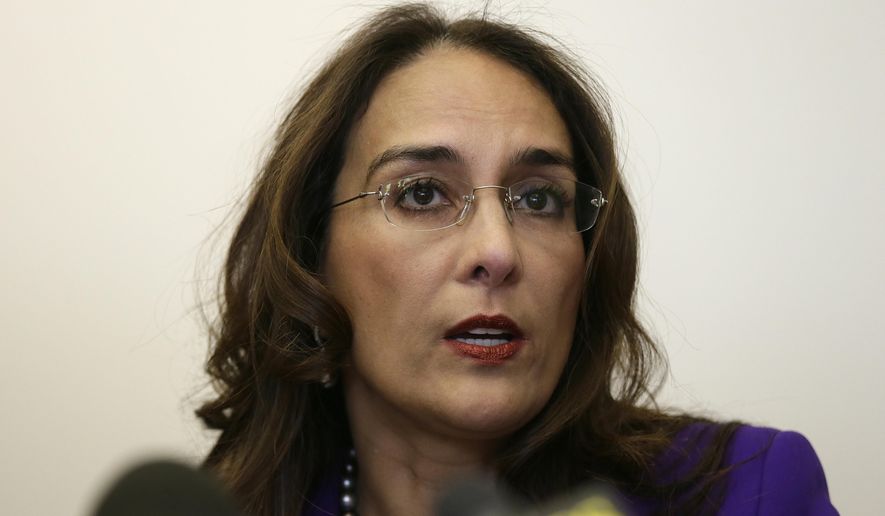Special-needs instructor Bethany Mendez has been fighting for months to escape the teachers union in Fremont, California, but the school district continues to funnel a portion of her paycheck directly to the labor bank account.
She joined four other public school educators in filing a federal class-action lawsuit Monday against the California Teachers Association to stop the forced collection of union dues, armed with last year’s landmark U.S. Supreme Court ruling in Janus v. AFSCME.
“This is a financial issue for many people as well as a personal choice,” Ms. Mendez said at a press conference in San Francisco. “It is unfathomable to me that after even receiving a revocation of consent, and the passing of Janus, that the local and state unions would continue to assert this mandatory deduction from our paychecks.”
The lawsuit, brought by San Francisco lawyer Harmeet K. Dhillon and the Freedom Foundation, comes with unions scrambling to retain members after the 5-4 Janus ruling. The court said that requiring public-sector employees to pay union fees violates their First Amendment rights.
“Unions are unjustly enriched and benefit themselves at the expense of plaintiffs by retaining the dues over the objections and without the consent of the plaintiffs,” said Ms. Dhillon, a Republican National Committee member from California.
The Golden State lawsuit is the latest post-Janus legal action brought by the Freedom Foundation, which also has filed lawsuits on behalf of public employees trying to cut their union ties in Oregon and Washington.
Named with the state teachers union in Monday’s litigation were California Attorney General Xavier Becerra, the National Education Association, five local unions and five school superintendents.
A spokesperson for Mr. Becerra said he had not seen the lawsuit.
“This is just another lawsuit from the Freedom Foundation to continue the attack on public education and public employees,” said Claudia Briggs, a spokeswoman for the California Teachers Association, which has about 325,000 members.
The percentage of public school teachers who belong to unions has been declining steadily for years, even before Janus. About 70 percent were union members in the 2015-16 National Teacher and Principal Survey, down from 74 percent in 2011-12, according to Education Week.
Fearing the outcome of the Janus case, which has the potential to obliterate public-sector unions, teachers unions undertook vigorous membership drives at the end of the 2017-18 school year, just weeks before the Supreme Court’s June 27 ruling.
Ms. Mendez said she was reluctant to sign her recommitment card but did so on June 4, unaware of the imminent Janus decision and under pressure from union organizers who approached her at her elementary school.
“They pushed these recommitments knowing full well that the passing of Janus may occur, but the employees were never informed of this,” Ms. Mendez said. “So I signed, believing there were no other options available to me and that the deductions would be made regardless. These commitment cards have locked employees into funding the union.”
In an Oct. 12 letter, she notified the union she had resigned and revoked any dues-collecting authorization, but the CTA told her in a Feb. 8 response that she could quit only during a 30-day window described as “not less than thirty (30) days and not more than sixty (60) days before the annual anniversary date” of her recommitment.
Two union representatives came to her classroom seeking to persuade her to stay, but she “told them she did not appreciate being bombarded with pro-union propaganda while at work,” according to the lawsuit.
Freedom Foundation attorney Mariah Gondeiro-Watt argued that any union membership card signed before June 27 is “worthless,” unless the union can prove that the signers were “fully apprised” of their rights.
“It doesn’t make any difference when the teachers signed their membership forms,” Ms. Gondeiro-Watt said. “No membership agreement before or since Janus is valid unless the public-sector worker affirmatively and knowingly agreed to waive his or her First Amendment rights.”
Labor supporters have argued that employees who quit to save money on dues are “free riders” who still reap the benefits of membership, while Ms. Dhillon pointed out that the unions enjoy exclusive rights to represent workers under California law.
“What we’re looking for is really more options for teachers, but most importantly, that No. 1, that the state comply with the Constitution,” Ms. Dhillon said. “And the state is involved here because the state makes the unions the exclusive representative, and there is no competition in that system.”
Ms. Mendez said the district deducts about $1,500 each year from her paycheck for dues on behalf of the Fremont Unified District Teachers Association. That’s real money for public employees trying to make ends meet in pricey Northern California, she said.
“These dues are a negative financial impact to a lot of teachers who live in the Bay Area, where there’s a high cost of living,” she said.
Then there’s the political piece. The NEA and its affiliates spent more than $30 million in the 2016 election season, throwing its support overwhelmingly behind Democratic and liberal candidates and causes, according to the Center for Responsive Politics.
“The unions use the plaintiffs’ dues deductions to promote many political positions with which the plaintiffs in our lawsuit do not agree,” Ms. Dhillon said.
• This article is based in part on wire service reports.
• Valerie Richardson can be reached at vrichardson@washingtontimes.com.




Please read our comment policy before commenting.